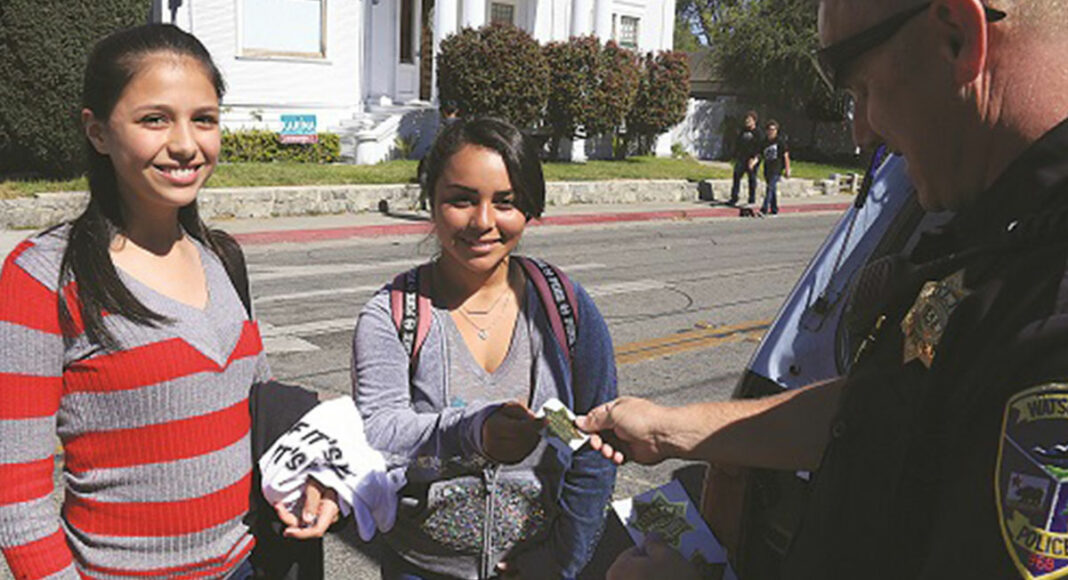The Pajaro Valley Unified School District Board of Trustees on Wednesday voted to permanently end its School Resource Officer program at Watsonville, Pajaro Valley and Aptos high schools, and to redirect the funds to socio-emotional counselors.
The district will also look into creating wellness centers and cultural sensitivity programs.
The motion passed 5-2, with Trustees Daniel Dodge, Jr. and Georgia Acosta dissenting.
About 40 people emailed comments to the board before the vote, most of whom advocated for removing the officers.
Elias Gonzalez said that there is no evidence SROs prevent violence.
“And in some cases, there is evidence they contribute to the school-to-prison pipeline,” he said, adding that having police on campus can make students more fearful.
The program cost PVUSD $405,265 annually for one Watsonville Police officer at Watsonville High and one at Pajaro Valley High, and one Santa Cruz County Sheriff’s deputy at Aptos High School.
The trustees were set to vote on removing the school officers for only the 2020-21 school year, and to use the funds for socio-emotional counselors, but Trustee Maria Orozco made the motion to make the decision permanent.
Orozco also called for the creation of a “robust” ethnic studies program along with student wellness centers equipped to help students. She also asked for an anti-bullying program.
“Our students deserve better,” she said. “We need to invest money in programs we know actually work.”
Trustee Jennifer Schacher said that the 40 hours of training SROs receive is not enough to handle the problems facing young people.
“More than ever,” she said, “the district needs socio-emotional counselors”
Trustees Acosta and Dodge expressed concern that the move would make it difficult for the district to work with county law enforcement officials in the future.
“Violence on campus is still an issue,” Acosta said, and asked the board to remove the officers for only the 2020-21 year, since all students will be off-campus and engaged in distance learning for the year. That motion was voted down 5-2, with trustees Dodge and Acosta in support.
SROs receive special training to work on school campuses, including implicit bias and de-escalation. They conduct welfare checks and home visits and connect at-risk students to diversion programs. They also work with attendance specialists and parents in trying to keep kids in school.
But many people who commented—and several trustees—worried that police presence on campus criminalizes behavior that can be better addressed by counselors and other programs.
Pajaro Valley High athletic director Joe Manfre said that he wanted the district to keep the program.
“I believe they have treated students fairly and have made good relationships with the students on our campuses,” he said. “I think it would be a shame to get rid of them. I would hope some of the students’ lives that have been changed by our SROs would speak during this time, so some good things can be heard about this program.”
In removing the officers, PVUSD joins districts throughout the nation that are questioning the programs. The Oakland Unified School District Board of Trustees in June eliminated that district’s program, which placed 10 officers on campuses.
The program began in 1994 at Watsonville High School to address school threats such as gang violence, drug use and other criminal acts, said Assistant Superintendent of Secondary Education Kristen Shouse.
Aptos and Pajaro Valley high schools followed suit with the program in 2004.
Shouse pointed out that the district still used WPD’s Caminos Program and the department’s Police Activities League, both of which are designed to keep kids out of trouble and in school.
The Santa Cruz County Sheriff’s Office declined to comment on the issue.
Watsonville Assistant Police Chief Tom Sims said he was not surprised by the decision, as both PVUSD and WPD are facing budget shortfalls.
Sims stressed that the relationship between the district and police department remains strong.
“At the end of the day it’s a difficult decision for them to make, because there is value in having SROs on campus,” Sims said.
But the decision could have fallout, Sims said, as there will no longer be a law enforcement official on hand for an immediate response.
This means that, for lower priority calls, officers may take longer to respond, Sims said.
“We are generally in close proximity, but also as much as we support our schools they will be on a triage basis,” he said.
In addition, having a patrol officer respond to an on-campus incident could mean a higher likelihood that a student could be taken to Juvenile Hall, as opposed to a response from an SRO who is familiar with the student, Sims said.
“The SROs provide a service you really can’t put a number on,” Sims said. “They are priceless. You get the best of both worlds. You get the red carpet service from the police department.”














